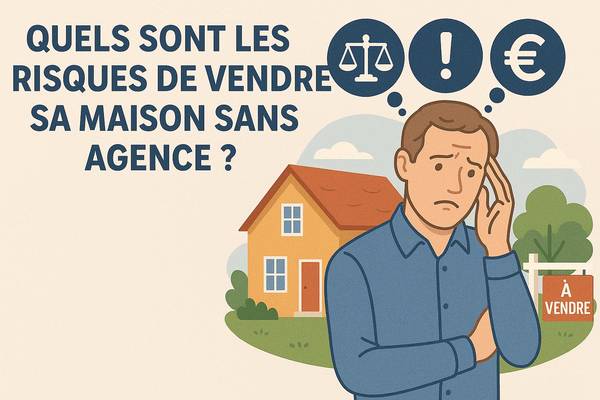Real Estate Advice
May 02, 2025
What are the risks of selling your home without an estate agent?
Selling your house or apartment without a real estate agency involves significant risks.

While not paying agency fees may seem appealing, selling a property on your own is often far riskier than people think.
Between pricing errors, poorly planned strategies, unsuitable visits, legal pitfalls, or badly handled negotiations, it’s often the seller who ends up losing money.
To better understand, your real estate agency in Nice, Winter Immobilier, looks at the key issues of a real estate sale and explains the risks of selling a house or apartment without an agent.
Setting a price that doesn’t match the market
One of the first hurdles for private sellers is setting the selling price. While this may appear simple, it’s actually strategic. If misjudged, it can quickly compromise the sale.
A price that’s too high: immediate deterrent
When you overestimate your property’s value, you risk making it invisible on the market. An overpriced home attracts few visitors, receives few offers, or only very low ones. Worse still: the longer a property stays online, the more suspicious it looks. Buyers wonder why it hasn’t sold. The result? Negotiation becomes harder, and the seller often ends up lowering the price — sometimes significantly.
A price that’s too low: direct financial loss
On the other hand, setting a low price to sell quickly can work — but often below its real value. Without deep knowledge of the local market and current demand, the seller could lose thousands of euros — a loss that exceeds any agency fees they hoped to save.
Valuing a property isn’t just about looking at listings online. It’s about analyzing recent transactions, property features (floor, light, condition, view), current demand, and short- and mid-term trends. This is where a real estate agent makes the difference. With local experience and professional tools, they set a fair, market-aligned price that attracts the right buyers and optimizes the final sale price.
Poor sales strategy
Selling a home isn’t just about posting an ad online. It’s a commercial operation that requires method, strategy, and know-how. If poorly prepared, the sale can damage the property’s image from day one — a mistake that’s hard to fix.
A weak listing = little interest
A poorly written ad, with no clear structure or details, or full of vague descriptions, won’t catch the eye of buyers. The first few seconds matter — if the property doesn’t stand out, it will be ignored.
Photos also play a key role. Dark, blurry, or poorly framed images give a bad first impression.
Limited exposure = reduced visibility
When selling alone, individuals don’t have access to professional platforms. As a result, the property is listed on fewer channels and reaches a much smaller audience.
An agency uses a comprehensive marketing strategy: specialist websites, social media, a database of qualified buyers, virtual tours, and sometimes targeted campaigns. This professional visibility helps spark quick interest and creates a positive momentum for the sale.
Poor presentation = lower perceived value
Beyond text and photos, there’s the staging of the property. A real estate agent will advise on decluttering and neutralizing spaces, small repairs, the best photo angles, and key features to highlight in the listing.
The goal: to showcase the property in its best light and create that emotional connection with the potential buyer.
Poorly prepared visits
Another risk of selling your home without an agent is poorly organized visits. Property visits are a critical step in the sale process. This is when buyers project themselves into the space, assess its potential and value, and start considering an offer. But if visits are disorganized or improvised, they can actually scare off interested buyers.
Common mistakes include:
- Poor home preparation: If a home is cluttered, messy, dark, or poorly presented, it’s hard for buyers to imagine themselves there — which can reduce enthusiasm and hurt their decision.
- Owner behavior: Sellers are often too emotionally attached, lack objectivity, react poorly to comments, or reveal sensitive information about timing or motivations — weakening their negotiation position.
- Unclear technical or legal answers: Today’s buyers are well-informed. Sellers who can’t clearly answer questions about diagnostics, fees, works, or neighbors lose credibility — and possibly the sale.
- No visitor screening: Without proper vetting, private sellers expose themselves to unnecessary or unsafe visits — from curious passersby, unqualified buyers, or even ill-intentioned visitors. Agencies filter visitors to ensure serious and secure contacts.
Overlooking legal aspects of the sale
Selling a property isn’t just about finding a buyer — it’s about complying with strict legal requirements at every stage. Without an agent, the risk of error is real, and the consequences — financial or legal — can be serious.
One common trap is mandatory diagnostics: they must be complete, up to date, and delivered at the time of the promise of sale, or else the buyer may cancel or sue.
The pre-sale agreement (compromis de vente), a legally binding document, must be precisely written, with clear clauses and detailed descriptions. Any mistake or omission can lead to disputes.
The seller must also disclose easements, urban planning rules, or unapproved works — issues that private sellers often overlook.
After accepting an offer, coordinating everything until the final sale requires vigilance and close follow-up with the notary to avoid delays or last-minute issues.
Handling negotiations and offers alone
Another risk of selling your property without an agent is the negotiation phase. This is a key stage of the process, and without experience, sellers can struggle against informed buyers.
Initial offers are often mishandled: some are rejected too quickly, others accepted without checking the buyer’s financial profile or conditions. Without perspective, it’s hard to distinguish a genuine negotiation from pressure tactics. Some buyers use emotional arguments or exaggerate defects to push the price down — which can destabilize an unprepared seller.
Emotional attachment to the home makes decisions even harder: criticism hurts, and compromise feels like a loss.
That’s why working with an agent is essential. A real estate professional brings objectivity, method, and skill. They protect the seller’s interests while maintaining a constructive dialogue, analyze each offer, and help close the deal under the best conditions.
Underestimating financial and legal risks
Selling without an agency means exposing yourself to often underestimated risks. A single mistake can have major consequences — even after the sale.
Delays and last-minute blocks
A poorly written agreement, missing documents, or timeline mismanagement can delay or cancel the sale, causing unexpected costs or affecting future plans.
Legal disputes after the sale
Even after signing, the seller remains responsible. If a hidden defect or missing information (works, HOA, easements) emerges, the buyer may take legal action, seeking compensation or cancellation.
Long-term liability
Some legal actions can be filed years later. Without support, the seller is left to face long, costly, and complex procedures alone. A professional helps secure the transaction legally.
Why working with an agency reduces these risks
Using a real estate agency doesn’t just mean delegating. It means securing every stage of the process and benefiting from professional support that reduces errors, financial loss, and legal risk.
Here’s what a real estate agent brings:
- Accurate and realistic valuation based on local expertise, recent sales, and trends
- Professional marketing: compelling listings, quality photos, presentation advice, and staging
- Maximum visibility: presence on major platforms, access to qualified buyers, and broad exposure
- Buyer screening: solvency checks, visit filtering, time-saving coordination
- Skilled visit and negotiation handling: objective presentation, clear responses, support with counter-offers
- Legal protection: document checks, compliance with diagnostics, contract drafting, and deadline management
- Support through to final signing: coordination with the notary, administrative follow-up, issue prevention
With a professional, you can sell under better conditions and avoid costly mistakes or wasted time — often far greater than the agency fees you hoped to save. Selling alone may look cheaper, but it’s a risky gamble.
Do you live on the French Riviera or own a second home there? Wondering whether to sell through an agency? Whether it’s caution, bad past experiences, or budget concerns, don’t hesitate to ask us for advice before deciding. We’re a family-run agency specializing in the Nice area since 1958, and we’re here to help! Call us at 04 93 44 42 47 or use the contact form. We’ll answer your questions with no obligation. Want to know more? Visit this page to learn about our sales process and client testimonials. We wish you every success in your future real estate plans!






